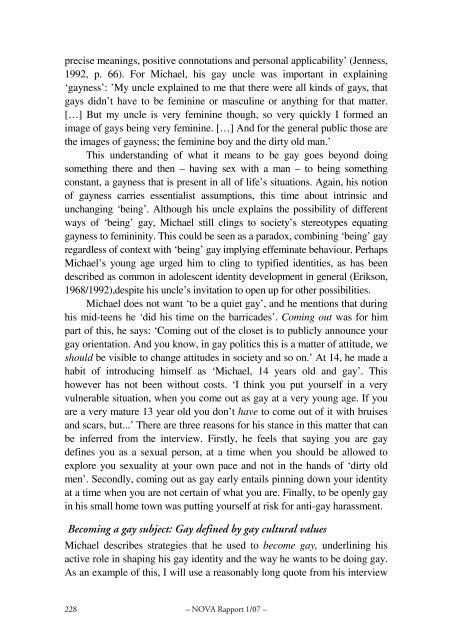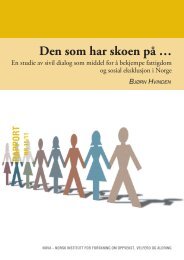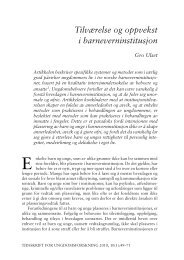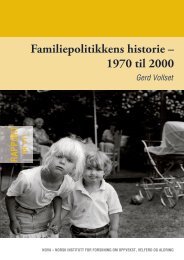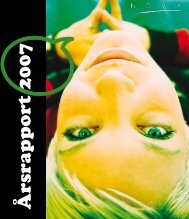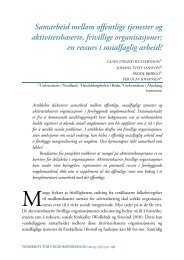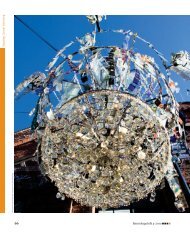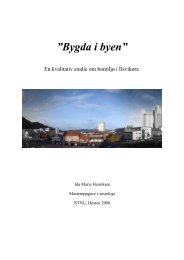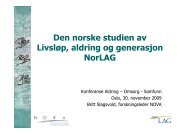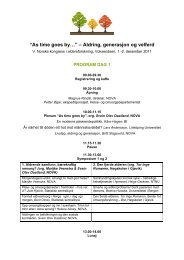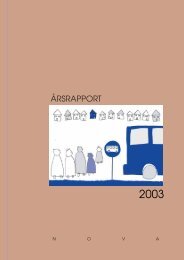Betydningen av seksuell erfaring, tiltrekning og identitet for ...
Betydningen av seksuell erfaring, tiltrekning og identitet for ...
Betydningen av seksuell erfaring, tiltrekning og identitet for ...
You also want an ePaper? Increase the reach of your titles
YUMPU automatically turns print PDFs into web optimized ePapers that Google loves.
precise meanings, positive connotations and personal applicability’ (Jenness,<br />
1992, p. 66). For Michael, his gay uncle was important in explaining<br />
‘gayness’: ’My uncle explained to me that there were all kinds of gays, that<br />
gays didn’t h<strong>av</strong>e to be feminine or masculine or anything <strong>for</strong> that matter.<br />
[…] But my uncle is very feminine though, so very quickly I <strong>for</strong>med an<br />
image of gays being very feminine. […] And <strong>for</strong> the general public those are<br />
the images of gayness; the feminine boy and the dirty old man.’<br />
This understanding of what it means to be gay goes beyond doing<br />
something there and then – h<strong>av</strong>ing sex with a man – to being something<br />
constant, a gayness that is present in all of life’s situations. Again, his notion<br />
of gayness carries essentialist assumptions, this time about intrinsic and<br />
unchanging ‘being’. Although his uncle explains the possibility of different<br />
ways of ‘being’ gay, Michael still clings to society’s stereotypes equating<br />
gayness to femininity. This could be seen as a paradox, combining ‘being’ gay<br />
regardless of context with ‘being’ gay implying effeminate beh<strong>av</strong>iour. Perhaps<br />
Michael’s young age urged him to cling to typified identities, as has been<br />
described as common in adolescent identity development in general (Erikson,<br />
1968/1992),despite his uncle’s invitation to open up <strong>for</strong> other possibilities.<br />
Michael does not want ‘to be a quiet gay’, and he mentions that during<br />
his mid-teens he ‘did his time on the barricades’. Coming out was <strong>for</strong> him<br />
part of this, he says: ‘Coming out of the closet is to publicly announce your<br />
gay orientation. And you know, in gay politics this is a matter of attitude, we<br />
should be visible to change attitudes in society and so on.’ At 14, he made a<br />
habit of introducing himself as ‘Michael, 14 years old and gay’. This<br />
however has not been without costs. ‘I think you put yourself in a very<br />
vulnerable situation, when you come out as gay at a very young age. If you<br />
are a very mature 13 year old you don’t h<strong>av</strong>e to come out of it with bruises<br />
and scars, but...’ There are three reasons <strong>for</strong> his stance in this matter that can<br />
be inferred from the interview. Firstly, he feels that saying you are gay<br />
defines you as a sexual person, at a time when you should be allowed to<br />
explore you sexuality at your own pace and not in the hands of ‘dirty old<br />
men’. Secondly, coming out as gay early entails pinning down your identity<br />
at a time when you are not certain of what you are. Finally, to be openly gay<br />
in his small home town was putting yourself at risk <strong>for</strong> anti-gay harassment.<br />
Becoming a gay subject: Gay defined by gay cultural values<br />
Michael describes strategies that he used to become gay, underlining his<br />
active role in shaping his gay identity and the way he wants to be doing gay.<br />
As an example of this, I will use a reasonably long quote from his interview<br />
228<br />
– NOVA Rapport 1/07 –


